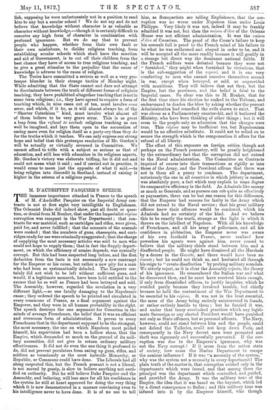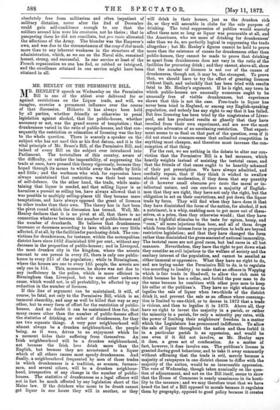M. D'AITDRIFFET PASINIER'S SPEECH.
MHE immense importance attached in France to the speech
of M. d'Audriffet Pasquier on the Imperial Army con- tracts is not at first sight very intelligible to Englishmen. The Orleanist Duke did indeed show, past all doubt or ques- tion, or denial from M. Rouher, that under the Imperialist regime corruption was rampant in the War Department ; that con- tracts for war materiel, such as cartridges and rifles, were given, paid for, and never fulfilled ; that the accounts of the arsenals were cooked ; that the numbers of guns, chassepots, and cart- ridges ready for use were criminally exaggerated; that the charge of supplying the most necessary articles was sold to men who could not hope to supply them; that in fact the Supply depart- ment, on which the efficiency of armies depends, was cynically corrupt. But this had been suspected long before, and the first deduction from the facts is not necessarily a new contempt for the Emperor or his cause, but rather a new pity for a man who had been so systematically deluded. The Emperor cer- tainly did not wish to be left without sufficient guns, and would, if a legitimate monarch, have been held entitled to the excuse that be as well as France had been betrayed and sold. The Assembly, however, regarded the revelation in a very different light,--as one fatally damaging to the Napoleonic cause ; they ordered the speech to be printed and circulated in every commune of France, as a final argument against the Emperor, and they were in all human probability in the right. The speech destroys the one argument for Caesarism in the minds of average Frenchmen, the belief that it was an efficient and strenuous form of administration. It proves to every Frenchman thatin the department supposed to be the strongest, the most necessary, the one on which Napoleon most prided himself, his supervision had been a hollow sham, that the Empire, which demanded so much on the ground of its mili- tary necessities, did not give in return ordinary military effectiveness. It did not do even the one thing it professed to do, did not prevent peculators from eating up guns, rifles, and soldiers as voraciously as the most imbecile Monarchy, or Republic, or Commune could have done. The Liberals had all along suspected this, but the French peasant is not a liberal, is not moved by gossip, is slow to believe anything not certi- fied on authority. But he will believe Duke Pasquier and the Assembly, and believing, willlose once for all his confidence in the system he still at heart approved for doing the very thing which it is now demonstrated in a manner convincing even to his intelligence never to have done. It is of no use to tell him, as Bonapartista are telling Englishmen, that the cor- ruption was no worse under Napoleon than under Louis Philippe. Very likely it was not, indeed it may be frankly admitted it was not, but then the raison d'être of the Orleans House was not efficient administration. It was the raison d'être of Caesarism. The proof of the Caesar's failure to keep his arsenals full is proof to the French mind of his failure to be what he was enthroned and obeyed in order to be, and it will be accepted all the more readily because it will gratify in a strange but direct way the dominant national foible. If the French soldiers were defeated because they were not "furnished," they might when furnished be victorious, that is the sub-suggestion of the exposé, and it is one very comforting to men who cannot conceive themselves second in war, except when betrayed, or sold, or unprovided with munitions. They will believe that not they, but the Empire, lost the provinces, and the belief is fatal to the Imperial cause. So clear was this to M. Rouher, that for the first time since his election he rushed to the Tribune, and endeavoured to deaden the blow by asking whether the present Administration had remedied the evils shown to exist. That was clever as a Parliamentary counter-hit, and it bothered the Ministry, who have been thinking of other things ; but it will seem to the people only an admission that the charges were true. This re'gime may be inefficient too, but Napoleonism would be no effective substitute. It could not be relied on to secure the strength which is the compensation it offers for the refusal of all liberty.
The effect of this exposure on foreign critics, though not perhaps on the French peasantry, will be greatly heightened by the extraordinary fact that the corruption did not extend to the Naval administration. The Committee on Contracts inquired of course into their transactions as rigidly as into those of the Army, and the President affirms that there was not in them all a penny to condemn. The department, notoriously the one in all countries in which jobbery is easiest, was absolutely pure, a fact which may explain in some degree its comparative efficiency in the field. As Admirals like money as much as Generals, and as pursers can rob quite as effectively as paymasters, there can be but one reason for this difference, that the Emperor had reasons for laxity in the Army which did not extend to the Naval service ; that his great military officers knew their offences would be condoned, which his Admirals had no certainty of the kind. And we believe this to be exactly the truth, strange as the light is which it throws on the intellect of Napoleon. With all his knowledge of Frenchmen, and all his army of policemen, and all his confidence in plebiscites, the Emperor never was aware of his own foothold in France, never realized how powerless his agents were against him, never ceased to believe that the military chiefs stood between him and a disaffected people. He might have dismissed all the Marshals by a decree in the Gazette, and there would have been no &mute; but he could not think so, and hesitated all through his reign to "create disaffection" by probing military scandals. We utterly reject, as it is clear the Assembly rejects, the theory of his ignorance. He remembered the Italian war and what he discovered then, and he must have received hints enough, if only from dissatisfied officers, to justify inquiries, which he avoided partly because they involved trouble, but chiefly because he held the contentment of the War Department to be essential to his regime. It was not in the least essential, the mass of the Army being entirely uninterested in frauds, or rather entirely hostile to them ; but he fancied it was, and under that fancy overlooked practices which any legiti- mate Sovereign or any elected President would have punished not only as State offences, but as personal affronts. The Navy, however, could not stand between him and the people, could
not defend the Tuileries, could not keep down Paris, and consequently in the Navy decent men were promoted and theft was rigorously and successfully prevented. If the cor- ruption was due to the Emperor's ignorance, why was not the Navy corrupt ? If it arose from the rotten state of society, how came the Marine Department to escape the noxious influence ? If it was "a necessity of the system," why was the system not a necessity in every department? The plain truth of the matter is, that corruption existed only in the departments which were feared, and that among these the principal was the department which controlled, and guided, and provided the Army. It was the military tone of the Empire, the idea that it was based on the bayonet, which led by a direct consequence to Sedan ; and this military tone was infused into it by the Emperor himself, who though
absolutely free from militarism and often impatient of military dictation, never after the 2nd of December could gain self-confidence enough to see that the soldiers around him were his creatures, not he theirs ; that in pampering them he did not conciliate, but pro tanto alienated the affections of the Army. The blunder was the Emperor's own, and was due to the circumstances of the coup d'e'tat much more than to any inherent weakness in the structure of the administration, which, as we see on the Naval side, remained honest, strong, and successful. In one service at least of the French organization no one has fled, or robbed or intrigued, and the excellence attained in one service might have been attained in all.



































 Previous page
Previous page